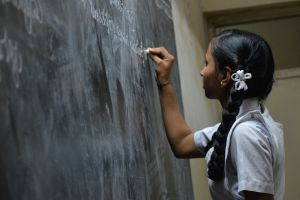Investing in girls' education can put countries on the path to a more stable, prosperous future.
Summary
This report demonstrates that educating girls has the power to break the cycle of poverty and transform societies. Educating girls has a multiplier effect: better health, prevention of early marriage and violence, lower fertility rates, higher family incomes, stronger community engagement, and better outcomes for their own children. Investing in girls’ education can put countries on the path to a more stable, prosperous future.
The barriers to educating girls are numerous and complicated. Safety issues, school fees, family demands, and social and cultural norms, as well as lack of access to qualified teachers and adequate facilities, often combine to keep girls out of school. This paper argues that despite ample evidence of the transformative power of educating girls, not enough is being done to advance the advocacy for, research on, and promotion of girls’ education and empowerment. As the author states, education for all girls is not just a right, but a responsibility.



